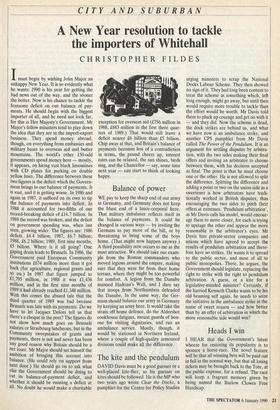The kite and the pendulum
DAVID Davis must be a good guesser or a well-placed kite-flier, so his guesses on kites should be followed. He is the MP who two years ago wrote Clear the Docks, a pamphlet for the Centre for Policy Studies urging ministers to scrap the National Docks Labour Scheme. They then showed no sign of it. They had long been content to treat the scheme as something which, left long enough, might go away, but until then would require more trouble to tackle than the effort would be worth. Mr Davis told them to pluck up courage and get on with it — and they did. Now the scheme is dead, the dock strikes are behind us, and what we have now is an ambulance strike, and another CPS pamphlet from Mr Davis called The Power of the Pendulum. It is an argument for settling disputes by arbitra- tion, with the two sides making their final offers and inviting an arbitrator to choose between them, with his decision accepted as final. The point is that he must choose one or the other. He is not allowed to split the difference. Splitting the difference and adding a point or two on the union side as a sweetener is how arbitrators have tradi- tionally worked in British disputes, thus encouraging the two sides to pitch their offers at extremes. Pendulum arbitration', as Mr Davis calls his model, would encour- age them to move closer, for each is trying to upstage the other and appear the more reasonable in the arbitrator's eyes. Mr Davis lists private-sector companies and unions which have agreed to accept the results of pendulum arbitration and there- fore have no strikes. He wants it to spread to the public sector, and most of all to public monopolies. There, he argues, the Government should legislate, replacing the right to strike with the right to pendulum arbitration. A guess, or a kite for a legislative-minded minister? Certainly, if the harried Kenneth Clarke wants to be his old beaming self again, he needs to seize the initiative in the ambulance strike in the name of sweet reason — and how better than by an offer of arbitration in which the more reasonable side would win?










































 Previous page
Previous page